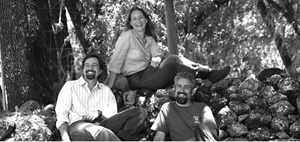Lancaster Estate Winery: winery information

Winemaker: Jennifer Higgins
“Lancaster is that rare thing among wineries. Every decision we make—from growing and harvesting the grapes to winemaking, barrel aging and bottling— cultivates the character of our wines. All of our grapes are grown here on the Estate, which means I spend lots of time walking in the vineyard, developing an understanding of every row in every block. It’s this understanding and an integrated approach to winegrowing that allows us to make wines that consistently honor and reflect the essence of the Estate.”
~ Winemaker, Jennifer Higgins
Jennifer joined Lancaster Estate in 1999 as the Assistant Winemaker, attracted to working for a winery dedicated to crafting limited-production, Estate-grown wines. Jennifer is a graduate of UC Davis, with a degree in biochemistry. She credits her winemaking philosophy and style to the influence of her mentors—such notable winemakers as Jill Davis, Margaret Davenport, and David Ramey. She was promoted to Winemaker in April, 2004.
DAVID RAMEY
Jennifer and her production team are aided by renowned winemaker David Ramey. Most notably, Mr. Ramey has assisted some of the world’s finest wine producers, such as Chateau Petrus in Bordeaux, and Dominus and Rudd in Napa Valley. In addition to consulting with Lancaster Estate and other fine wine producers, he has his own winery in Healdsburg.
DANIEL ROBERTS
To ensure improvement with each vintage, we recently hired viticulturist Daniel Roberts, Ph.D. and his team at Integrated Winegrowing to study and measure our viticultural efforts. Dan Roberts, aka “Dr. Dirt,” is a renowned vineyard specialist who has directed winegrowing research at Jackson Family Farms as well as consulting with many other fine wine producers. He received his Ph.D. in soils science from UC Davis.
"Integrated Winegrowing is a team concept which assumes that every proposed vineyard location is unique. From there, we each apply our talents or strengths to the vineyard which allows us to analyze all factors that will affect the life of each individual vine, and ultimately enhance the quality of fruit produced on an annual basis."
~ Daniel Roberts, Ph.D.
Annual Production: 4,000 cases
Our 53 hillside-acres of vineyards are located in the eastern hills of southern Alexander Valley, at the confluence of the Chalk Hill and Knights Valley appellations. This southern “sub-appellation” is emerging as a leading location for producing Cabernet-based blends. Most sought after are the region’s hillsides and mountain locations, where diverse, nutrient-deficient soil types and microclimates are proving ideal for developing concentrated varietal character.
Microclimates
Our Estate’s diverse micro-climates are ideal for growing Bordeaux varieties. Warm temperatures start early in the year and continue through October for late, yet ideal, ripening conditions. A very slight marine influence affects our Estate through the Petaluma Gap, giving it the diurnal temperature differentiation—or warm days and cool nights—of classic winegrowing regions throughout the world.
Daytime temperatures are very similar to Napa Valley’s Oakville region. However, nights at Lancaster Estate are approximately 3° warmer than Oakville. The nighttime temperatures are both cool enough to maintain optimum acidity in grapes and warm enough to allow them to continue ripening throughout the growing period. This extended growing period is vital to slowly developing varietal maturity and provides synchrony of sugar, acid and flavor ripeness.
Reduced Yields
Reduced yields and inputs maintain the purity of our Estate’s expression and character. We actively manage vine vigor and encourage low yields by employing classic viticultural practices such as cluster thinning and deficit irrigation. Additionally, our Estate’s hillside orientation, higher-density vine spacing, and low-nutrient soil compositions control vine vigor and reduce yields. All of these efforts allow quality to emerge from the vineyard, resulting in grapes of concentrated flavor and character.
Our Estate is currently planted to:
Cabernet Sauvignon (65.5%)
Merlot (26.6%)
Cabernet Franc (3.7%)
Malbec (3.4%)
Petit Verdot (0.7%)
Sustainable Practices
Sustainable farming techniques maintain the integrity of our wines’ origins. We employ permanent cover crops to improve drainage, replenish the soil nutrients and reduce erosion. We also encourage natural predators, such as colonies of raptors and beneficial insects, to eliminate vine pests.
Vineyard Evolution
The evolution of our vineyard’s core attributes is central in our efforts to cultivate grapes with concentrated varietal character. To ensure improvement with each vintage, we recently hired viticulturist Daniel Roberts, Ph.D. and his team at Integrated Winegrowing to study and measure our viticultural efforts. Initial work has included evaluation of soil structures and irrigation practices, as well as satellite mapping and climatic analyses. This vital investment has defined key vineyard decisions such as rootstock selection, vine row orientations, nutrient applications, and improved water management practices.
Grape Varieties Planted
